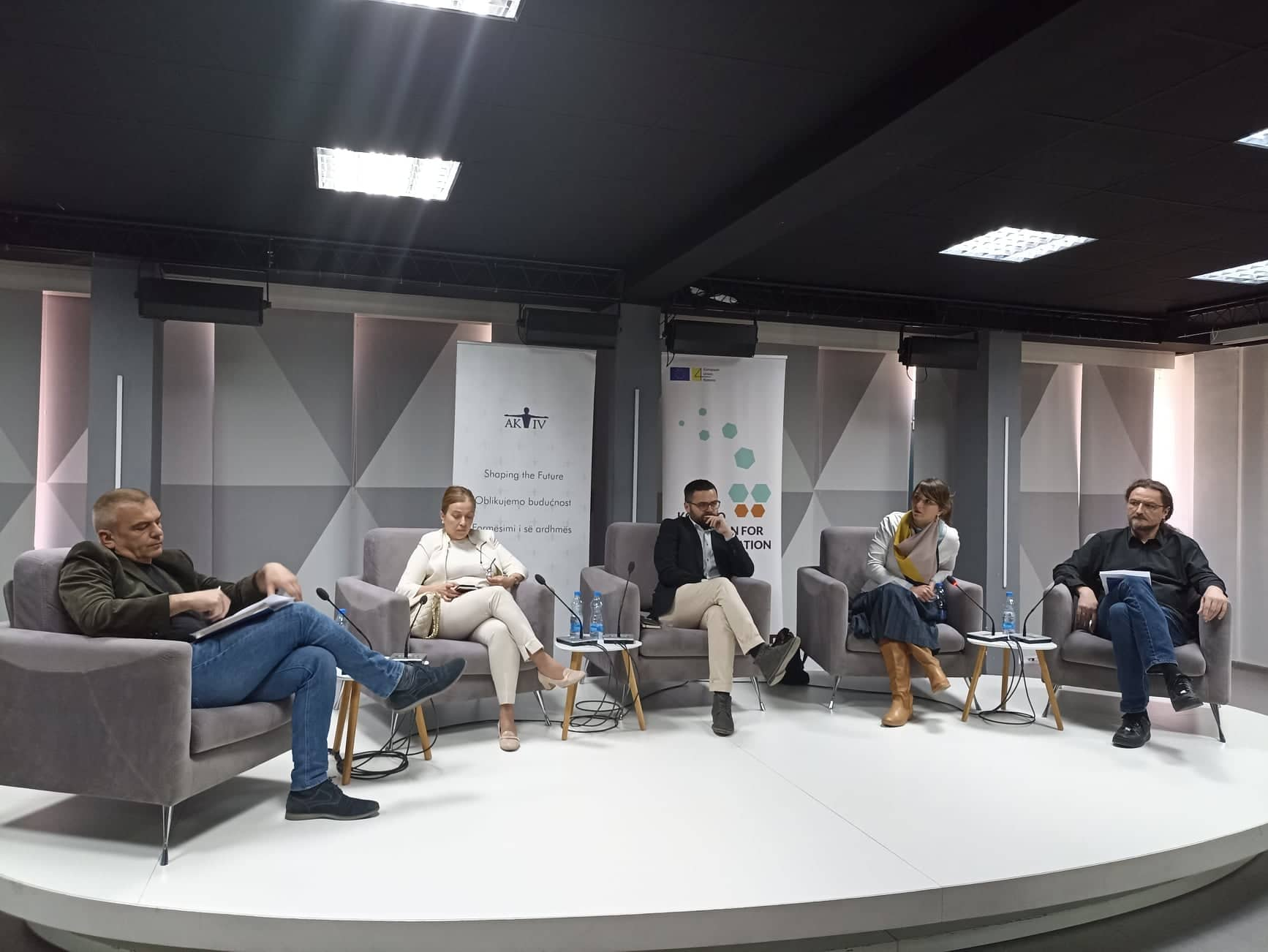Category: Blog Organizations: NGO Aktiv Tags: #MEDIA
Is the role of the media, in addition to reporting, also to participate in the reconciliation process? Can the media influence the reconciliation process at all? Or can they influence to deepen the "differences"?
Editors of KoSSev portal Tatjana Lazarevic, Kosovo 2.0. Besa Luci, RTV Kim Goran Avramović, and the president of the Association of Journalists of Kosovo, Xhemajl Rexha, answered these questions by discussing the most important topics concerning the media in Serbian and Albanian in Kosovo at a panel organized within the Future Forum.
"The role of the media is not to make peace, but to inform," said Lazarevic, adding that "the media can help in making peace, but also that they are currently making divisions among people."
She also assessed that the war in Ukraine "exposed the degeneration of the media" in the most direct way possible:
"The occupation of truth and the ubiquitous media abuse."
"I no longer see the role of the media through this exclusively professional component, but now for me, it is a question of humanity as well - what kind of crime we commit by killing the truth, and how the war besides battlefields is equally waged in the media too."
Lazarević states that when it comes to the domestic media, such a situation is not in the interest of the citizens and the public.
"The media, both in Serbian and Albanian, i.e., the media in Kosovo and Serbia, even before the war in Ukraine were deeply entrenched, of course, with some exceptions both in Serbia and Kosovo.
But the war in Ukraine only shed light on the absence, not only of the professional component but also of the human component - about what we write, how we report, how we look at events and what kind of absence the other side is doing, unless the other side is a symbol of evil, I'm talking about the mainstream here. "
"And when I said that the media in Kosovo and Serbia, or the media in Albanian and Serbian, are in trouble, I meant that the press, alongside politicians, plays a crucial role in why there is no understanding between two nations. For years, we have seen this media trend holding two nations opposite each other. So if they can do that, they can also bring the two nations closer together, " she said.
She also warned that the media in Serbian and Albanian in Kosovo have entirely different and exclusive narratives, taking as an example the reporting on war victims, i.e., non-reporting on war victims from another community.
The media play an essential role in the reconciliation process, says Besa Luci, editor of Kosovo 2.0.
Just as the media plays an important role in reconciliation, she also assessed that they could influence differences and divisions in society.
She also notes that both Serbs and Albanians are portrayed in the media most often through ethnicity: "That ethnicity serves as a division, without seeing each other as citizens."
That is why she warns that journalists should deal with issues of interest to citizens and truthfully report on events and the lives of citizens. She reminds us that, for example, there were no media reports on how certain agreements and decisions of the government affected the lives of ordinary citizens of Albanian and Serbian nationality.
"There are very few such media reports," she said, citing three reasons for such a situation in the media.
Firstly, she believes that political elites control the public and media discourse, both in the past and in the present:
"It is the political machinery that controls the media and political parties and everything else, and in a way, they do not allow those 'other' stories."
The second reason, in her opinion, is the economic viability of the media. More clicks are needed for the media to be more profitable, hence tabloidization.
Finally, the third reason lies in journalists themselves, who are influenced by narratives through schooling, public opinion and media reporting. Later as journalists, they participate in the "same cycle" of media content production.
The role of the media is to report and not to make peace - states the editor of RTV Kim Goran Avramović.
On the other hand, the media, not only in Kosovo, mainly report on high politics: "On existing political disputes or on things that are extremely tabloid in nature."
All this hides from the audience the everyday life we live, he adds, and turns reporting into dealing with "virtual topics":
"Some meetings are being announced, we analyze what is happening or not happening in Brussels, and in the meantime, our life is going through something called the status quo."
"There are no stories on economic development, environment protection, topics that should concern ordinary people. Political elites impose this trend in all parts of the Balkans. In this way, the need to regulate communities' life and quality of life on the ground is surpassed.
"No one is talking about caring for the needs of citizens, there is no true commitment to solving their problems, and all of that is shadowed due to high politics," he added.
The president of the Association of Journalists of Kosovo, Xhemajl Rexha, believes that the media are not the main obstacle to reconciliation in Kosovo, but also they are not enabling it.
One of the obstacles to the cooperation between Serbian and Albanian journalists is the lack of knowledge of the Serbian and Albanian languages.
He stressed the importance of respecting journalistic ethics, regardless of whether journalists report on topics concerning other communities. Journalists from both the Serbian and Albanian communities should report and bring stories from both sides and, as he pointed out, without prejudice.
"We are often not aware of the sensitivity of the other side, of the simplest things, for example, the way we address each other," said Rexha.
"We have to understand each other. We have to cooperate with each other in our profession," he said, citing the exchange of contacts as a practical example of cooperation. The cooperation of commissions for missing persons is a good example of cooperation.
The Future Forum was organized on April 12th and 13th by the NGO Aktiv and the Kosovo Coalition for Reconciliation members.




